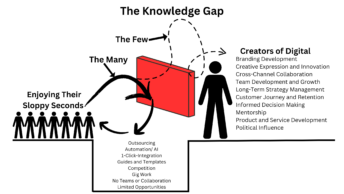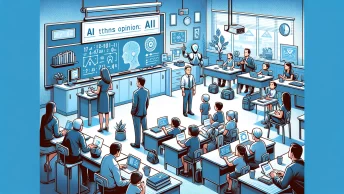Throughout human history, we have filled libraries and museums with information. But these spaces have limitations of size and cost to operate. Administrators are selective about what should be on display and will rotate out books and artifacts as necessary – the best items remain, a representation of what humanity can achieve.
Comparatively, text data requires little storage and bandwidth. Even in the 1990s, when the first servers were deployed and accessible via directories, you could distribute a library’s worth of books with relatively little overhead.
With repositories of nothingness before us, we got to work filling the digital void. From the best humanity had to offer to the worst, it did not matter.
Insatiable Demand for Content
Overnight, businesses, bloggers, journalists, and academics began uploading data to web domains that, if indexable, Google would display on its search engine results page (SERP).
But what happens when a search engine finds multiple pages around the same topic?
Google developed an algorithm known as PageRank. Initially, the primary factors for ranking pages were keywords and backlinks. Savvy individuals discovered how to manipulate the algorithm by building multiple web domains and linking between them. This led to the concept of personal blog networks (PBNs) combined with keyword stuffing to create networks of websites that could dominate SERP for almost any keyword.
Then came the words. The more words on the page, the better your rank.
Editor’s note: I am being reductive in describing the evolution of the search engine and how Google ranks pages to illustrate my point about content creation and how it came to flood the internet.
The Content Farm
In a flash, writers became a hot commodity. But there were not enough writers to go around. In part because writers were not familiar with the concept of writing on the internet.
Enter the content farm. Content farms were and still are a place where writers work to produce a large volume of words daily. These sprouted up all over, advertising that anyone could write full-time to earn a living doing what they love. In some cases, you could do it remotely, adding to the convenience.
While some content farms specialize in specific niches and hire writers with expertise in those fields, most rely on information taken from existing sources or are made up. The latter is more common as it is faster and therefore less expensive. Likewise, credibility and truthfulness did not equate to better rankings.
Society was not prepared for the rise of misinformation spread by the internet. If a library hosts a book that spreads misinformation, it can easily be discussed as part of a community forum and pulled. The same goes for a museum for a forgery. But the internet is decentralized and with few if any gatekeepers. Once something is posted online it is nearly impossible to remove.
To be fair, not all content farms or freelance writers actively sought to spread misinformation or to create poorly written. Some people were instructed to write a certain way, and they needed a paycheck, so they did it without question. Others were just trying to keep pace with their competitors.
But the pace never slowed. It only hastened, and the content farms and freelancers available were not enough. There was a need for more content than we had labor.
The Gig Platform
Globalization hit the digital world in the early 2010s as the internet became more common in places around the world. With this came gig platforms like Upwork and Fiverr.
This helped to turn a labor shortage for writers into an oversupply of writers. If you had a computer and were willing to bid the lowest dollar amount, you were getting writing jobs. But at $1 or less an article, the pace at which someone had to write content meant that standards dropped to zero.
And just when we were sure it could not get worse, OpenAI released its first iteration of GPT to developers, such as Jasper (formerly Jarvis,) and the first generation of generative text tools landed, and the results speak for themselves.
Search Generative Experience
When Google released SGE into beta, something became immediately clear: The internet has a serious content problem that will only get worse.
In its current iteration, Search Generative Experience is meant to help users gain deeper insight into their search query without having to click a link. But the actual user experience ranges from acceptable to outright bad. I wrote about my disappointment with Search Generative Experience and how large language models were built by stealing copyrighted materials.
To understand what is going on with SGE and what it reveals about the state of the internet, we have to understand LLMs. LLMs are trained using data collected from multiple sources, including the Internet. Blog posts, Reddit posts, SEO spam websites, comment boxes, news websites, research databases, and any other accessible repository of information are used to train the LLM.
While there is good content on the internet, the internet is also full of bad writing, poor editing, and lackluster or non-existent research or involvement of SMEs in creating content.
As a result, LLMs are fundamentally broken. When you ask an LLM to write new content, it can only write content as well as the aggregate of data that was used during its training.
An LLM is not intelligent. It does not understand what is being generated, nor can it create anything new intentionally.
So the content that is generated using an LLM is necessarily derivative, low quality, and can be wrong because the internet presents a lot of conflicting data, facts, and research. To fix an LLM, a team of humans would have to input or revise the data to improve its accuracy manually.
It is important to point out that OpenAI hires humans to manually review queries made in ChatGPT to correct issues.
But what about the internet at large? Will Google hire an army of human writers to rewrite everything? When flying by the seat of their pants, a good writer can produce 2,000 to 5,000 words a day reliably, without editing, deep research, or interviews.
But a human writer conducting research and interviews before writing any content to ensure it meets E-E-A-T guidelines may only get 1,000 or fewer words finished a day. That writer may also only produce five articles or fewer per week. Writers with the skills necessary to perform interviews and research topics are also relatively scarce and will need training, assuming they have an interest in performing these tasks.
But we are not going to figure that problem out because there is no incentive.
The problem we decided to solve instead is how to remove labor entirely from the writing process. So we built LLM-powered web tools that allow anyone to generate content for pennies an article. Simply feed a list of keywords from your SEM tool of choice into the program and press “Generate.”
You can generate hundreds of keyword optimized articles at a time, with each one containing several thousand words. Repeat this process each day over weeks and months, and you will have produced millions of words and hundreds of thousands of articles.
All of the text content found on the internet today took over two decades to create. Now imagine using an LLM to speed up that process a thousandfold, doubling or tripling the amount of text content within just a few years.
If you now have ten websites but are limited by your budget, you could offload any writers and use your budget to scale to 100 websites. Instead of paying $5 to $20 per article, you now just need an LLM to generate thousands of articles with millions of words in a month for about $3,000. Do not worry about reviewing the content or even basic editing. It does not matter.
In defense of ChatGPT, I will admit that it can replace many basic types of writing, like business emails, copywriting related to product descriptions or social media posts, writing resumes, and potentially even college essays. Much of this work does not demand much originality or creativity.
But at what point do we finally say enough? How much more disposable, derivative, and factually incorrect information will we take?
This discussion is more than just the ethics of how or why we use AI to generate content. We also have to weigh the risk that these tools will squeeze out journalists, novelists, editors, researchers, and anyone else who simply can not keep up with the volume of work produced by these generative tools.
Unless something changes, we may find ourselves in a vicious cycle where we are using LLMs to write content based on what has come before, and then generate new content that is based on what has come before, and then generate new content that is based on what comes before. On and on and on it goes.
A Hopeless Internet Without Better Content
Google has an AI policy, and they say using generative AI is fine. Provided the AI content is not used to create SEO spam or violate E-E-A-T. Ironically, SGE does just that, which was the inspiration for this article.
Despite Google’s guidance, the creation and distribution of low-quality content has been ongoing for more than a decade, and it does not feel like Google is reacting to what is happening today. After all, none of this has affected its market share or ad revenue. And people are reporting growing traffic and rankings even as they mass produce AI-generated SEO spam articles.
There is reason to think that Google does not want to react because many businesses and jobs exist because of how content is produced today. There are also many small and medium businesses that pay a lot of money to marketers and agencies to optimize their SEO and content using these spam tactics.
This is all without even giving consideration to the possibility that Google simply has no mechanisms to understand the content on the page the way that is explained in E-E-A-T and Helpful content. Or even that most of the written content on the internet is so bad that punishing one domain would not just lead to another domain with worse content rising to the top.
Alternatively, if Google does not go far enough, publishers who produce human-centric, thoughtful, and well-researched content may no longer be incentivized to continue because they can not compete.
A Pragmatic View of the Future
There are two possibilities for what comes next.
- Google does nothing, and the proliferation of AI content accelerates. This scenario creates an unknown outcome, but it is unlikely to help with the prevalence of misinformation and domains that specialize in only spam content that fills SERP as is.
- Google turns the dial in favor of E-E-A-T and Helpful Content, and within the next 12 to 24 months, we see reports that spam and AI content are losing rankings.
If number one happens, we will continue to see a degradation of everything. More writers will report the loss of clients and having to start over in new careers. The journalism industry has already faced years of setbacks, and this will further add to the losses. We might look to video or audio as alternatives, but if we can not stop AI from saturating the internet with text, AI avatars and podcasts will be next.
If the second happens, then there is still hope for writers. In fact, many writers could position themselves to re-edit or otherwise fix all of the AI content so that Google will rank it favorably. However, to appease E-E-A-T and Helpful Content guidelines, you will need to learn skills beyond writing as a human.
The next sections aim to predict what being a writer might look like in the second-case scenario for the internet.
Writers: Less Writing and More Interviews and Videos
More writers will become journalists. They will spend most of their time conducting background research and interviewing SMEs. Those writers with an area of expertise, such as STEM, will remain primarily writers as they can be a leading source of information. However, they may also find it worthwhile to publish their own research or opinions to increase their visibility and value.
Regardless of their skill set and the type of work they do, writers will rely heavily on AI tools. These tools will help to fill in the gaps between their quotes and research, speeding up the creation process of articles. With the content completed, the writer will use other AI tools to help develop scripts, social media videos, podcasts, and other collateral materials with different strategies to promote and expand readership, relationships, and brand recognition.
Why Writers Will Dislike This Change
Writers will do much less writing. As a result, many writers will feel less like writers and more like taskmasters, pulling a lever on an assembly line as part of a larger content strategy. They will feel less of a connection to their work, possibly deciding to leave the industry. Others will despise being on camera during interviews or podcasts. To survive, writers must reframe what it means to write professionally – not hidden away in a dark corner and only typing on a keyboard.
Editors: Less Technical Work and More Relationships
Editors will spend less time editing, but not at first. Right now, human decision-making remains necessary when performing line editing, substantiate editing and developmental editing. Until tools like Grammarly or others become more powerful, editors should get more comfortable finding unique angles to stories, becoming better fact-checkers, learning to track and update older content to appease changes in search trends and SEO data, mentoring young writers on how to interview or appear on camera, how content-sharing strategies work, and helping to maintain relationships with SEOs and SMEs.
Why Editors Will Dislike This Change
Many editors will continue to perform tasks common to the field independent of AI. As a result, more writers may shift to editing, which may create an issue where editors have to take on more tasks once held by writers. Editors may also find they have to spend too much time training young writers and editors, or sifting through LinkedIn to find credible SMEs.
SEO: Less Algorithm Talk and More Strategy
Over the next few years, expect to see fewer large algorithm updates. Google’s Search technology is constantly improving and learning to weed out low-quality content, and there will come a point where the system works well enough without big updates. This will benefit SEOs who tire of the technical minutia of over-optimizing pages, farming content, backlinks, and skirting punishment from Google. Instead, SEOs may take on more of a project management role, overseeing aspects of content creation, data tracking, and communicating the latest SEO and search changes to staff.
Why SEOs Will Dislike This Change
SEOs will focus more on assisting creative teams in implementing new tools and procedures that make content creation more efficient. They must be people-first rather than sitting behind a computer and filling spreadsheets with keywords and traffic.
Unknown Variables
If you are not sure how to develop these skills, you are not alone. Looking at the job market today, it feels as though companies no longer want to onboard and train people. They want unicorns who are 100% competent at all 20 skills they want for that particular job. This means you must take the initiative to find courses online or on YouTube channels that offer guidance.
What might change things is that as baby boomers retire and Google pressures content producers away from how they write content today, we will see more demand for skilled workers than what is available – AI’s potential impact on the labor market may be partially overblown and unable to cushion the labor market from workers shortages as the pace of boomers retiring quickens. The result is that companies will have no choice but to develop training and retention strategies. This may shift the labor market even more toward the employee.
The other good news might be that writers will be a hot commodity, especially if you already have the above-listed skills. That will mean you can be the one to mentor and train younger staff. You may even find work as a consultant, where you help companies with existing teams to develop systems and skills on the fly.
To temper expectations, there could be downsides to all of this. As mentioned, those unwilling or unable to upskill will fall out of the industry. This includes many businesses.
The New Internet: A Smaller Place
Small and medium businesses will continue to win by carving out a corner in their niche across search, social, and video platforms where they can focus on branding and building a community. Those who are unable or unwilling to build their brand well will die off.
Many large companies will die under the weight of their internal politics, resistance to change, and a large volume of products and services. Amazon will need to evolve to stand separate from Google’s SERP unless Amazon can implement new content requirements, which many storefronts cannot afford to do.
Websites that were created and run to repurpose existing content, including information or news will also die because they may not want to invest in original reporting or hiring people who can handle those tasks.
All of this will lead to the consolidation of the Internet. How much it will shrink is anyone’s guess. It is bold to suggest that within ten years, half of all websites vying for a position in SERP may disappear. Finding certainty in these predictions is a fool’s errand, but we should prepare for the worst.
The big winners will be the New York Times, Fortune, and other editorial companies turned into ecommerce machines. The inherent trustworthiness of these brands and access to skilled editorial teams, SMEs, writers, editors, and other top talent will see these organizations flourish.
The cost of attracting and retaining multi-disciplined creative talent may be too much for everyone else. Many companies, especially those competing in the same industry, will have to merge. This could be a negative for the overall competition.
There will also be impacts on users.
Loss of Information Access, Paywalls, and Censorship
Users will also feel the impact of this with the loss of free information, conflicts created as commerce becomes more common to editorial sites, a rise in paywalls, and the potential for censorship.
For editorial websites, you might expect to see more sponsored content and collaborations with brands and individuals who sell products or services. This would lead to many writers and reporters spending more time working on the affiliate and commerce side of the business, cutting down on the available time to pursue meaningful stories. Additionally, while content teams will still produce investigative pieces, there will be conflicts of interest with sponsors and advertisers who may threaten to pull their deals unless the content is rewritten or changed to be more favorable towards their product or brand.
For those websites that choose to minimize affiliate and sponsored content, they will have to rely on paywalls, limiting access to important stories. This means that good information may be less accessible.
Portfolio websites and smaller editorial enterprises may struggle to compete in SERP and may not find the audience they want. While we want to pursue an internet that is more trustworthy and has higher quality content, those websites with more fringe ideas or are independent enough to tackle stories that others may choose to avoid will have to find audiences in other ways.
The good news is that the creator’s economy will fuel the future of the internet. And even small websites can seek support through donations or Patreon and reach audiences through social media platforms if they have the teams committed to making that happen. This is where branding will come in, requiring a lot more talent to help individuals and businesses reach the audience they want to connect with.
Google Can Innovate Again
We should not admonish Google too harshly. Before Google, the first search engines and directories indexed files and web pages on private or difficult-to-find servers. Information was not easily accessible, except for the most tech-literate. Then search technology evolved. No longer bound by directories and FTP access constraints, people could go to Google and type a word or phrase and connect with relevant content.
AltaVista and Yahoo! Search were two early successes that would shape search in the modern era, but Google became a dominant force because of a handful of crucial factors:
- Quality and speed of indexing – Google developed tools that allowed web admins and developers to index pages and display meta information in search results to make connecting content with users easier.
- Scale and feature growth – Expansion of infrastructure allowed Google to grow in step with the internet and new technologies, such as interactive elements such as maps, video content, new and expanded snippet features, local search, and machine learning that helped to deliver more relevant results based on geography and business listings.
- Ads – The foundation of Google, Google Ads brought monetization to search, which helped Google to fund new ventures and ecosystems with Workspace, Gmail, Youtube, Drive, and other new tools, often with no fees for individual users. This helped to build trust and brand awareness among the public, making Google a household name.
Many of us have had writing jobs because the internet exists. Others went on to start businesses that changed the world. And to Google’s credit, since the early 2000s, the company has worked to improve the technology and ranking factors driving search.
But nobody could have predicted that in 2023 we would reach a point where people would fight for an increasingly competitive and shrinking piece of SERP real estate by generating thousands of AI articles that are derivative and of low quality.
In my view, the internet should be a place that feels much more like a museum or library. A place where information is human-created, accessible, and trustworthy. There is no perfect solution, and there will be many downsides.
But the alternative is a lawless, AI future where all the text on the internet is doubled, tripled, or quadrupled every few years as individuals and businesses spin up domains and churn out derivative content without expert input or further spread misinformation.
This is all in Google’s hands. They can steer things in a new direction. They should take this opportunity before the best of our content teams are forced out of the field. That loss of creative talent would be devastating, and it is no help to Google, whose dominance over the market could be at risk.
Editorial note: All content is written entirely by Eric Mazzoni, a human. ChatGPT or other assistive writing tools are limited to ideation, outlining, and early-stage research. Grammarly, ProWritingAid, and Hemmingway Editor accelerate editing duties. All Midjourney images are labeled and created for private use without the consent of the artists whose work OpenAI and other technology companies leveraged in developing LLMs.



